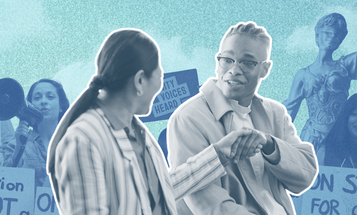
Reproductive Rights are Economic Rights: Expanding the Reach of the Supreme Court’s Abortion Decision
Women’s reproductive and economic freedoms do not, and have never, existed separately.
The Supreme Court’s decision on Monday striking down Texas’ extreme restrictions on access to abortion is a milestone in the effort to protect reproductive rights – but if that’s all we see, progressives will be missing a much larger lesson and opportunity for movement-building.
What is less understood, and needs to be lifted up, is that full protection of reproductive rights is also indispensable to economic opportunity and security for women and their families. By striking down Texas’ incredibly restrictive laws on Monday – and denying review of similar cases in Mississippi and Wisconsin that sought to restrict access to abortion – SCOTUS also helped to ensure economic justice for millions of women across the country.
Women’s reproductive and economic freedoms do not, and have never, existed separately. Greater reproductive autonomy – whether in the form of access to birth control, abortion, paid family leave, or child care – affords women greater economic security and mobility. Expanding that autonomy will benefit not just individual women, but all working families. It is essential to re-establishing the economic security that can underpin an emerging phenomenon – the sleeping giant of a renewed working class in America.
Yet in our current go-it-alone system, parenthood for middle- and low-income Americans has become intensely correlated with economic harm, even more so for women of color. We must make it less onerous for American parents to raise children, by guaranteeing paid family leave, affordable child care, and ensuring jobs pay a family-supporting wage. At the same time, we must guarantee access to reproductive rights as key to economic opportunity for women with low incomes. Abortion in the US has become concentrated among poor women. According to the Guttmacher Institute, 42% of women having abortions are living below the federal poverty line. Moreover, 7 in 10 would have preferred to have their abortions earlier in the pregnancy but were forced to delay in order to find the money to pay for it. Women also report having to borrow from friends or family in order to pay for their abortion, or forgo expenses such as rent, utilities and groceries.
The systemic harms to women’s economic opportunity stemming from limits on reproductive freedom can be enhanced or mitigated by a number of public policy choices, including but not limited to: access to health insurance, proximity to health care providers, access to ready cash, ramifications of the Hyde amendment (which blocks federal funding for abortion services), access to public transportation, and pregnancy discrimination. The groundbreaking “Turnaway Study” found that most women who seek abortion are already struggling financially, and many cite poverty as their main reason to seek abortion. Moreover, according to the Reproductive Health Technologies Project, a woman who is turned away for an abortion is more likely to be in poverty two years after the fact. Denying women reproductive autonomy compounds our existing economic inequality.
Meanwhile, the big money poured into lobbying to restrict women’s reproductive autonomy by wealthy donors has exacerbated what was already spotty and unequal access. Though policies that would expand reproductive rights enjoy widespread popularity, the policymaking agendas of our legislators block those rights at every step. The influence of money in politics means that our democracy is distorted, with an overwhelmingly white male government (two out of every three officials at city, state and federal levels are white men, according to the Reflective Democracy Project) ignoring the urgency of the need for full reproductive rights.
Our current system has not only forced the painful choice between economic security and parenthood upon American women, but stigmatized them for making it. To address the intertwined nature of women’s reproductive and economic freedoms, the progressive movement must bridge the divide between the reproductive and economic justice fields.
The Supreme Court’s decision on Monday not only blocks Texas’ indefensible restrictions on reproductive freedom, but also provides a platform to protect economic opportunity and security for women across the country. Understanding that connection should become the new work of a movement that connects reproductive justice with economic security for women and their families, and demands policies that advance both in a new virtuous circle of opportunity.



